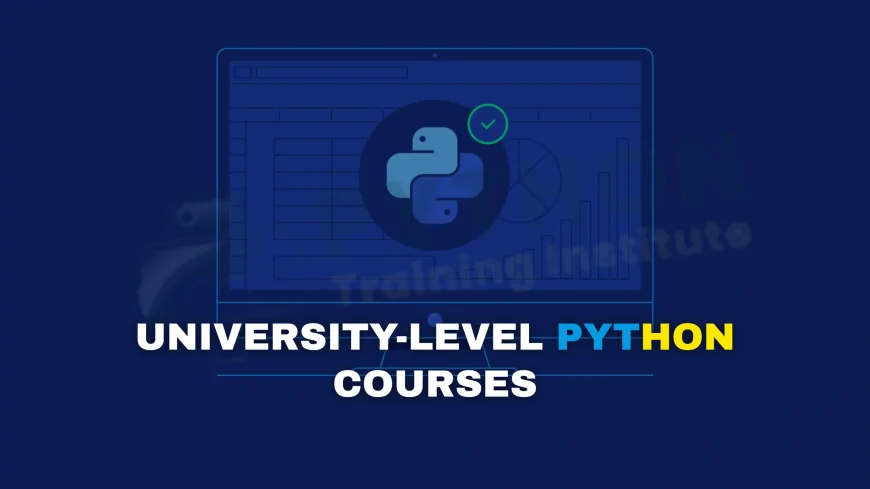University-Level Python Curriculum Courses Pune | Pune University-Based Python Learning Tracks
Explore top university-level Python curriculum courses in Pune with in-depth modules, project-based learning, certifications, and industry-aligned training. Ideal for students, engineers, and professionals seeking academic rigor and practical exposure in Python programming.

Table of Contents
- Introduction
- Why a University‑Level Python Curriculum?
- Overview of Python Courses in Pune
- Core Curriculum & Modules
- Advanced & Specialized Topics
- Teaching Methodologies
- Curriculum Aligned with Industry Needs
- Assessment & Evaluation
- Certifications & Career Pathways
- Top Institutes Delivering University‑Level Python in Pune
- Supplementary Learning Resources
- Student Support & Peer Networks
- Flexible Learning Delivery Models
- Fee Structure & Scholarships
- FAQs
- Conclusion
Introduction
In today’s dynamic tech landscape, a university‑level Python curriculum refers to a rigorous, structured, and research-informed pathway that goes beyond basic programming—delving into algorithms, system design, data science, AI, and software engineering best practices. Pune's educational ecosystem, comprising universities, polytechnics, and training centers, now offers such comprehensive Python courses designed to empower students, professionals, and academic learners. This article explores the full scope of what makes university‑style Python training transformative: from core foundational modules to specialized disciplines, industry linkages, experiential learning, assessments, and career positioning—all rooted in Pune’s vibrant knowledge ecosystem.
Why a University‑Level Python Curriculum?
A university‑style curriculum ensures:
-
Depth and Rigor: Syllabus includes theoretical foundations (e.g., programming paradigms, data structures) and ensures conceptual clarity.
-
Structured Pathway: Clear progression from basic syntax to advanced topics, following academic standards.
-
Research-Orientation: Inclusion of lab work, mini research projects, and opportunities for publication or conference participation.
-
Holistic Skill-Development: Communication skills, academic writing, collaborative projects, and critical thinking.
-
Credibility: Recognized certification with sponsored internships or placement tie-ups.
Overview of Python Courses in Pune
Pune institutions offering university-level Python training include:
-
Symbiosis Institute of Technology (SIT) – Certificate courses & Hons electives.
-
Pune University’s Department of Computer Science – Summer schools, workshop-style modules.
-
MIT-WPU (World Peace University) – Semester-integrated Python foundational courses plus AI tracks.
-
Rowan School of Engineering & Research – Python with software systems engineering emphasis.
-
Corporate training partners – Customized postgraduate programs involving project credits, co-taught by industry and academic faculty (e.g., iAIM, C-DAC, Symbiosis School of Data Science).
These programs offer structured term-based timelines, credit evaluation, and evaluation through assignments, quizzes, mid-terms, labs, and final exams.
Core Curriculum & Modules
Typical first-year university‑level Python modules include:
-
Introduction to Python Programming
-
Basic syntax, variables, data types
-
I/O handling, error & exception management
-
-
Data Structures & Algorithms in Python
-
Lists, stacks, queues, trees, graphs
-
Sorting (quicksort, mergesort), searching (binary search), recursion, dynamic programming
-
-
Object‑Oriented Programming
-
Classes, inheritance, polymorphism, encapsulation
-
Design patterns and code organization
-
-
Software Engineering & Version Control
-
Agile / Scrum methodologies, software development lifecycle
-
Git, GitHub workflows, unit testing, CI/CD fundamentals
-
-
Database and Persistence
-
SQL & NoSQL integration (SQLite, PostgreSQL, MongoDB)
-
ORMs (SQLAlchemy, Django ORM)
-
Advanced & Specialized Topics
After foundational topics, students explore:
-
Web Development
-
Django, Flask
-
REST APIs, JSON, web security, session management
-
-
Data Science and Machine Learning
-
Numpy, Pandas for data wrangling
-
ML modules with scikit-learn; basic neural networks
-
-
Artificial Intelligence Applications
-
Intro to TensorFlow / PyTorch, NLP basics, Transformers
-
-
Computer Vision
-
OpenCV usage, image detection/classification
-
-
Parallel & Distributed Computing
-
Multiprocessing, threading, async I/O
-
Basics of microservices
-
-
Cloud and DevOps Practices
-
Docker containerization, deployments to AWS or GCP
-
Container orchestration intro (Kubernetes overview)
-
-
Software Testing & Quality Engineering
-
TDD (Test Driven Development), pytest, performance testing, code-coverage tools
-
Teaching Methodologies
-
Lectures + Tutorials + Labs: University structure; weekly lectures followed by tutorial/lab sessions.
-
Project-Based Learning: Focused on mini‑projects per module, culminating in capstones (e.g., ML research project, full‑stack app).
-
Peer Review & Code Walkthroughs: Encourages academic collaboration and critical thinking.
-
Assessment Variety: Quizzes, midterms, final exams; viva voce; lab submissions; paper presentations.
-
AI / Research Exposure: Optional research project or independent study modules available in tech tracks.
Curriculum Aligned with Industry Needs
-
Tech Bootcamps and Hackathons: Interface with companies like Persistent, Infosys, Capgemini.
-
Internships and Apprenticeships: Embedded in the curriculum with credit hours at companies like Zensar, Ignatiuz.
-
Guest Lectures & Panel Discussions: Delivered by Pune’s tech leads across data science, finance, and ed-tech.
-
Capstone Projects with Real Clients: In partnership with startups and NGOs.
Assessment & Evaluation
-
Continuous Assessment: Weekly quizzes, lab tasks, peer review sessions
-
Mid/Semester Exams: A mix of theoretical and coding-based evaluations
-
Project Evaluations: Viva + code review on projects such as research analysis or SaaS application MVPs
-
Final Exams: Comprehensive coverage of theoretical and applied aspects
Certifications & Career Pathways
Upon completion, students receive:
-
University Certificates: Endorsed by Pune University / affiliating bodies
-
Digital Badges: Shareable for LinkedIn and employers
-
Pathways to Internships: Offered for top performers via institute-industry partnerships
-
Career Mobility: Positions in AI, data science, software engineering via campus recruitment or job fairs
Top Institutes Delivering University‑Level Python in Pune
-
Symbiosis Institute of Technology – certificate-style and adjunct courses
-
MIT‑WPU – structured electives in Python + applied AI
-
Pune University – summer schools and continuing education modules
-
National Institute of Electronics & Information Technology (NIELIT) – Python modules with basis to O-level / B-level programming streams
-
C-DAC Pune – Python for data analysis in postgraduate curriculum
Supplementary Learning Resources
-
Open Courseware: MIT OCW, IIT Bombay OSCAR for Python fundamentals
-
Online Platforms: Coursera / edX Python specializations (University of Michigan, Rice)
-
Textbooks: “Python Crash Course” by Eric Matthes; “Fluent Python”; “Automate the Boring Stuff…”
-
Research Tools: Google Colab, Jupyter notebooks for experimentation
Student Support & Peer Networks
-
Dedicated Forums: Slack or Discord groups for course discussion
-
Peer‑Learning Circles: Study sessions and code review meetups
-
Teaching Assistants / Faculty Hours: Weekly office hours and mentoring
-
Alumni Forums: Yearly workshops led by past students now in industry
Flexible Learning Delivery Models
-
Full-time / Semester-Based: Intended for degree or diploma tracks
-
Weekend / Evening Classes: For working professionals or students
-
Online Mixed Mode: Hybrid blend of in-person and online sessions
-
Bootcamps & Crash Courses: 4- to 8-week intensive formats during semester breaks
Fee Structure & Scholarships
| Institute | Approx. Fees (INR) | Scholarships / Waivers |
|---|---|---|
| Symbiosis / MIT-WPU | ₹30,000 – ₹60,000 | Merit-based scholarships, sports reserves |
| C‑DAC / NIELIT | ₹15,000 – ₹40,000 | Government subsidized rates |
| Summer Schools / Bootcamps | ₹10,000 – ₹25,000 (Short duration) | Early-bird and group discounts |
Additional options include educational loans, interest waivers, and institute fee funding schemes for high-performers.
FAQs
1. What is a university‑level Python curriculum?
It’s a structured program with theoretical and practical modules, covering Python programming, data structures, software engineering, and optional AI/data science specializations.
2. How is this different from basic Python bootcamps?
University-level courses include research-led learning, academic credits, formal assessments (exams, viva, papers), and industry-linked projects.
3. Who is the target audience for these programs?
Undergraduates, postgraduates, working professionals seeking upskilling, researchers, and anyone interested in deep Python expertise.
4. How long does such a curriculum typically last?
Them range from 8 weeks (short courses) up to 6 months or full academic semesters for credit-based programs.
5. Are these programs offered online?
Yes, multiple Pune institutions offer hybrid/online versions alongside in-person classes.
6. Are there labs and hands-on components?
Absolutely. Labs, mini-projects, and coding assignments are mandatory across modules.
7. Is industry alignment part of the curriculum?
Yes—guest lectures, internships, placements, and client-linked capstones are included for exposure to real-world problems.
8. Can I get academic credits?
Yes, if courses are part of affiliated universities like PU or MIT-WPU, they come with credits recognizable for degree programs.
9. What advanced topics are covered?
AI/ML, computer vision, web development, cloud computing, DevOps, parallel algorithms, and research methods.
10. Is assessment theory heavy?
Assessment blends theoretical exams with practical assessments, viva, peer review, and project delivery.
11. Will I receive certification?
Yes—official university certificate, digital badge, and transcript for academic progression.
12. What career outcomes can I expect?
Roles in software engineering, data science, AI research, backend development, DevOps, system design, and technical consulting.
13. Are there scholarships available?
Many institutes offer merit-based, sports, and special-interest scholarships or early-bird discounts.
14. Can professionals attend part-time?
Yes, evening/weekend versions and online attendance options are available for working individuals.
15. How much practical coding is involved?
High—most programs require ~60–70% lab/practical work, including coding, debugging, and documentation.
16. Do I need prior coding experience?
No, introductory modules begin at fundamentals before ramping into advanced material.
17. Can I switch to AI or data science tracks?
Yes, specializations in AI/ML, computer vision, NLP, and data analytics are offered post-core modules.
18. Are research projects optional?
Typically yes; you can choose a mini-research or academic project for credit or publication on request.
19. How will this benefit a startup aspirant?
You'll gain robust backend development, data analytics, and automation skills—essential for tech-intensive startup building.
20. How can I apply?
Visit institution websites or admission offices in Pune; many offer online forms, demo classes, and counseling.
Conclusion
A university‑level Python curriculum in Pune offers learners a powerful blend of academic depth, structured progression, and real-world relevance. From strong theoretical grounding to advanced AI and software engineering, participants emerge with credentials, industry exposure, and practical skills. Whether you're a student, working professional, or lifelong learner, these courses position you for impactful roles across sectors—from startups to research labs.
What's Your Reaction?
 Like
0
Like
0
 Dislike
0
Dislike
0
 Love
0
Love
0
 Funny
0
Funny
0
 Angry
0
Angry
0
 Sad
0
Sad
0
 Wow
0
Wow
0
















